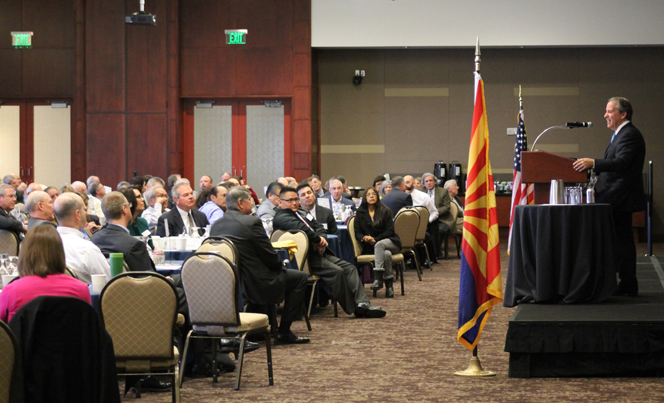An economic recovery without extremes taking place in a political atmosphere already full of them may not generate much enthusiasm. But only a few somber statements emerged from the Economic Outlook Conference held on the Northern Arizona University campus Thursday.
The conference, held at the High Country Conference Center in front of a capacity audience, was presented by the Alliance Bank Business Outreach Center of the W. A. Franke College of Business.

If anything, perspective, balance and even a little optimism carried the day. At either end of the insights and occasional barbs of three featured experts, NAU President Rita Cheng and keynote speaker Gene Sperling pointed to reasons for enthusiasm and offered parallel views on the crucial role of higher education.
Sperling infused his comments with the sort of policy foundation that would be expected from his past appointments as the top economic adviser to Presidents Clinton and Obama. Yet he spent the balance of his time extolling the virtues of compromise and speaking hopefully about a return to effective governance.
“It’s not just that Washington is broken. Our attitude about Washington is broken,” Sperling said. “I worry about Washington’s lack of willingness to compromise but I also worry our public attitudes do not recognize how difficult it is to govern. As a country, we need more of a perspective that rewards compromise.”
In an interview after the public presentation, Sperling expressed pride in being part of a team that “put in some difficult policies that helped pull the country back from the brink of a depression.” He also acknowledged that age, experience and distance from the Washington microscope—his service to President Obama ended in March—allow him a more balanced perspective he is eager to share.
“I say what I believe but I think people are so tired of hearing partisan comments,” Sperling said. “I’m just trying to say how things are.”
In that sense, Sperling’s assessment of the recovery as “dramatic but not that great” resonated with the theme of the day’s presentations. He emphasized there is a lot more good that could come from stronger growth, although he does find structural long-term unemployment to be worrisome.
Sperling’s to-do list for the nation to move the recovery along and build long-term prosperity featured three items: a college education for more people, especially those from the bottom 20 percent of the economic scale; an approach to helping more people accumulate wealth, such as through 401K accounts; and a direct connection between specialized training and obtaining a job.
As for policy, Sperling said he still supports the pro-growth progressive stance he wrote about in 2005.
“You need to both support stronger government roles in areas essential to creating opportunity, like higher education and schools, and to promoting the basic dignity and security of people, like having health security even if you lose your job,” Sperling said. “But at the same time, you can’t pretend there are easy solutions to ensuring growth is shared. You have to build up the supply of skills, research and innovation in your country.”
President Cheng also emphasized collaboration in her opening remarks, pointing to the economic benefits that accrue from a mutually beneficial relationship between the university and the community, if not the region. This “steward of place” approach is based on community engagement.
“We value the assets brought to us by the community and want the community, and the region, to understand what the university brings,” Cheng said. “We understand our role as a driver in this region but there’s much more to it than that. Through training STEM educators, preparing students in biotech labs and producing graduates with other specialized skills, we are delivering a workforce ready to move into high-demand, high wage jobs, and that’s good for all of us.”
Citing Flagstaff’s attributes as a center of education, research, diverse culture, entrepreneurship and outdoor recreation, Cheng said the community is ideally situated to participate in accelerating economic growth.
The morning’s other speakers offered their own finely tuned data and outlooks. NAU Professor Ron Gunderson pointed out a few positives and correlated the low price of gas to a potentially good retail holiday season, but also said he doesn’t expect rising consumer optimism to last long.
“I remain cautious in general but there are bright spots in some states and local areas,” Gunderson said, including Flagstaff among them, especially in terms of real estate values.
NAU Professor Dennis Foster focused on interest rates and inflation, noting modest signs of growth but potentially troubling indicators on the horizon.
“When it comes to robust economic growth, the odds are not in our favor,” Foster said.
Elliott Pollack, president of Elliott D. Pollack and Company, said the recovery should continue because of the lack of significant imbalances. His focus on Arizona included low growth in population and employment. “Our employment growth is a good recovery story but it’s still terrible compared with what we’re used to,” Pollack said.



